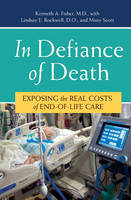
In Defiance of Death
Praeger Publishers Inc (Verlag)
978-0-275-99710-6 (ISBN)
End-of-life care in the U.S. has evolved over the years into a nightmare for patients and family members, and it has created a near-crushing financial burden on the medical system that is not just excessive but unsustainable.
Death is a natural part of life. But it has become a painful, protracted, humiliating process that is often inappropriate for the healthcare patient, puts an undue financial and emotional burden on the family, and provides a model of improper care for physicians in training. And it's expensive—about 22 percent of all medical expenditures are for people in the last year of their lives. Further, while studies show that 90 percent of all people would prefer to die at home surrounded by family and friends, the reality is that more than 70 percent die in institutions. As Dr. Ken Fisher argues so passionately in this book, it's time for a change.
End-of-life care in the U.S. has evolved over the years into a nightmare for patients and family members, and it has created a near-crushing financial burden on the medical system that is not just excessive but unsustainable. It has driven the cost of healthcare out of reach for many people, and it is a large factor in preventing the creation of universal coverage. In Defiance of Death reviews the current state of end-of-life care and highlights its many problems from a variety of economic, political, and social perspectives. Fisher and Rockwell illuminate the ethical dilemmas we all face as technology allows us to prolong life—but at a huge human and financial cost. This book documents these problems and provides a historical perspective of how our medical system evolved. It argues that America's defiance of death is far too costly and recommend that all stakeholders—including the public, medical community, Congress, and business leaders—join together to create a system that improves end-of-life care for everyone involved. This book, with workable solutions to improve our medical system, helps point the way.
Kenneth A. Fisher, M.D., is a nephrology consultant for the Borgess and Bronson Hospitals in Kalamazoo, Michigan. For over forty years, he has served in a variety of clinical, teaching, and research positions. He has written dozens of scientific and policy articles in such publications as Clinical Nephrology, American Journal of Physiology, American Journal of Medicine, and American Journal of Obstetrics and Gynecology. Lindsay E. Rockwell, D.O, is a hematologist and oncologist in private practice in Northampton, Massachusetts. She is the Director of Integrative Oncology at Cooley-Dickinson Hospital and is involved in numerous research endeavors examining the role of complementary medicine for the oncology patient. She has been published in the Journal of Clinical Oncology, presents at oncology conferences, and has a special interest in palliative care as well as women's issues in the context of cancer care. Missy Scott, a former broadcast journalist, is a freelance writer and instructional designer. She writes courseware and supporting materials for teachers in colleges, universities, and healthcare training schools.
List of Illustrations Foreword by Dr. Benjamin Brown Preface Acknowledgments Chapter One: Dying in America Today Chapter Two: Roots of the Problem: The Patient Self-Determination Act, Advance Directives, and the Americans with Disabilities Act Chapter Three: Why We Need Appropriate Care Committees Chapter Four: The Three Most Typical End-of-life Populations Chapter Five: Hospitals, Escalating Costs, and End-of-Life Care Chapter Six: Nursing Homes Chapter Seven: Palliative Care and Hospice Chapter Eight: A Big Step in The Right Direction: The VA Transforms End-of-Life Care Chapter Nine: Results of My Non-Scientific, Revealing Survey Chapter Ten: The Winds of Change: Suggestions for New Directions in End-of-life Care Appendix I: The Survey Questionnaires Appendix II : Family-Physician Interactions Appendix III: The Baby K Case Appendix IV: In Support of Appropriate Care Committees Cardiologists Get Wake-up Call on Stents by Mike Mitkam, (selected text) Journal of the American Medical Association. Geographical Variations in Medicare Spending, Editorial by Kenneth I. Shine, MD, Annals of Internal Medicine. Physician-Owned Specialty Hospitals and Coronary Revascularization Utilization Too Much of a Good Thing? By Peter Cram, MD, MBA Gary E. Rosenthal, MD (Selected Text) Journal of the American Medical Association. How Physicians Can Change the Future of Health Care by Michael E. Porter, PhD, MBA Elizabeth Olmsted Teisberg, PhD, MEngr, MS, (Selected Text) Journal of the American Medical Association. For Further Reading: A Selection of Titles for Further Investigation Appendix V: American Medical Education American Medical Education 100 Years after the Flexner Report by Molly Cooke, M.D., David M. Irby, Ph.D., William Sullivan, Ph.D., and Kenneth M. Ludmerer, M.D., New England Journal of Medicine. Appendix VI: Pharmaceutical Company Issues Surviving Sepsis--Practice Guidelines, Mar Campaigns, and Eli Lilly by Eichacker PQ, Natanson C, Danner RL. New England Journal of Medicine. Appendix VII: The Economic Impact of Our Health Care if We Do Not Change Aging Baby Boom Generation Will Increase Demand and Burden on Federal and State Budgets, GAO Report Appendix VIII: The Truth About Americas Health Care System--Most Expensive Bad Results What Cannot Be Said on Television About Health Care by E.J. Emanuel, MD. (abstract) Journal of the American Medical Association. Appendix IX: Dying in America National Institutes of Health State-of-the-Science Conference Statement on Improving End-of-Life Care, National Institutes of Health,State-of-the-Science Conference Statement Appendix X: Universal Health Care in America: TheLure of a Quick Fix Universal Health Care in America: The Lure of a Quick Fix by Kenneth A. Fisher, M.D. Glossary Index
| Erscheint lt. Verlag | 30.3.2008 |
|---|---|
| Sprache | englisch |
| Themenwelt | Medizin / Pharmazie ► Gesundheitswesen |
| Medizin / Pharmazie ► Medizinische Fachgebiete ► Medizinethik | |
| Medizin / Pharmazie ► Medizinische Fachgebiete ► Palliativmedizin | |
| Studium ► Querschnittsbereiche ► Geschichte / Ethik der Medizin | |
| ISBN-10 | 0-275-99710-3 / 0275997103 |
| ISBN-13 | 978-0-275-99710-6 / 9780275997106 |
| Zustand | Neuware |
| Haben Sie eine Frage zum Produkt? |
aus dem Bereich


